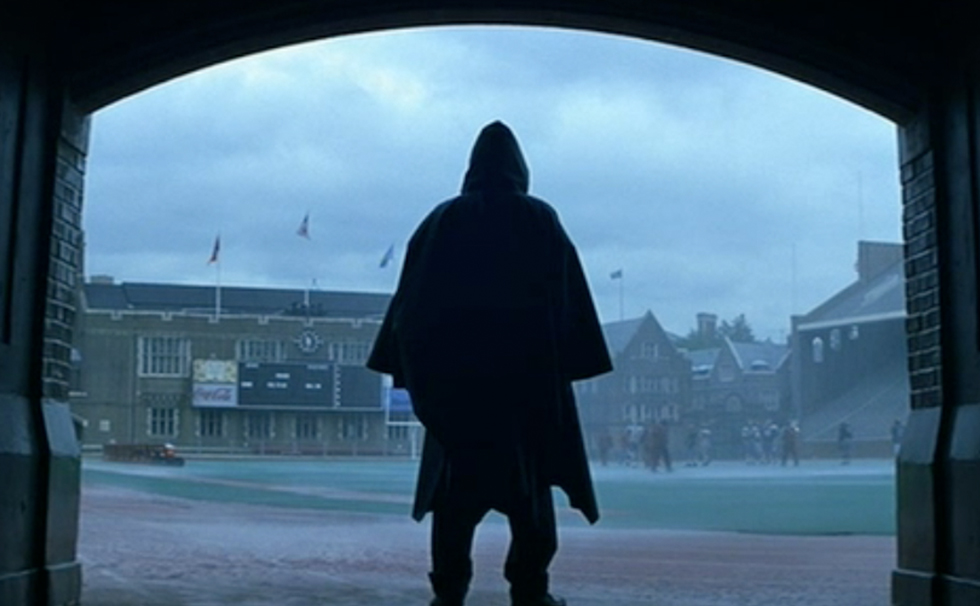I got a chance to re-watch a few scenes from
M. Night Shyamalan’s movie “Unbreakable” awhile back.
I’ve always liked the film, but this time I realized what a great illustration it is of someone desperate to find his purpose in the world—in this case, the antagonist, Elijah, played by Samuel L. Jackson.
Plot Summary
In case you haven’t seen the movie, I’ll grant you a summary. Elijah, who was born with four broken limbs, has lived a life in and out of medical facilities. He has a rare disorder that makes his bones extremely fragile and prone to breakage.
“They call me Mr. Glass,” he says.
He walks with a limp and uses a cane, and can’t count the number of times he’s had bones reset.
Elijah tracks down and befriends David, the hero, played by Bruce Willis. Unlike Elijah, David is the sole survivor of a disastrous train wreck—no one can understand how he walked away unscathed. Surprisingly, it’s not the first time. We learn that David has survived several unfortunate accidents, without so much as a hangnail to show for them.
Over the course of the film, Elijah tries to convince David that he is his polar opposite—the man who can’t be broken, a superhero meant to protect and serve. David doesn’t believe him at first, but gradually, as he struggles with a faltering marriage and a strange “sadness” he feels every morning, he realizes something is missing in his life.
He starts to test out Elijah’s theory. With his young son’s help, he begins to believe it might be true. One night, he uses his superior strength and survival capabilities to save two children from a vicious murderer—and gets the proof he’s been looking for.
The Main Character is Defined by His Polar Opposite
As David’s life comes into focus—his purpose clear, his family reunited, and the sadness gone—he visits Elijah to thank him for his help and support. But Elijah says now that they both know the truth, they must go their separate ways. (Spoiler alert!)
Elijah was the one responsible for the disastrous train wreck, as well as several other acts of terrorism over the years.
“The scariest thing is,” he says, “to not know your place in this world…to not know why you’re here.”
David is who Elijah thought he was, which means Elijah is “not a mistake.” He is the darkness to David’s light, the evil to his goodness, the yin to his yang.
“How can you tell who the villain is?” he says. “He’s the exact opposite of the hero.”
Why We Need Purpose, Above All
This movie brings home the point that humans need to feel they have a purpose. Without it, David was depressed and asleep while his life fell apart around him. Elijah was broken and desperate to find that his existence wasn’t just a cruel joke of nature.
What’s especially interesting is that Elijah, the “bad guy,” was better able to listen and follow his inner voice than David was, and it took Elijah’s pointed purpose and driving energy to bring David around to fulfilling his heroic potential.
I imagine there are all sorts of conclusions that might be drawn from the film, but I’d like to offer one. David is, like so many of us, walking around half asleep in his life. He feels somewhere inside that something is missing, but he’s not sure what it is. The feeling eats away at him so much that gradually he approaches everything with apathy, until his marriage, his career, and even his son grow ever distant, gray and meaningless.
It’s only when he embraces all aspects of himself and follows his inner voice that his life once again takes on meaning, and he finally steps into the light. Which by the way, takes a mountain of courage.
To feel fully alive, we must live on purpose. We must follow the inner voice, wherever it leads—no matter how scary the journey.
Are You Living on Purpose?
If you’re feeling like David, and you’re not sure yet of your place in this world, here’s an exercise for you: describe your polar opposite. Try to think of things that you are not. Write them down.
Next, write the opposite characteristic across from each original one. These words most likely describe who you are.
Finally, ask yourself—which characteristics are you most commonly portraying in your everyday life? That may help you see how close (or how far) you are from living your true purpose.
How to Clarify Who Your Hero Is
By the way, I’m sure you already know that this is a good example of setting up the protagonist and antagonist in a story. If you find one or both are incomplete in the project you’re working on, try using the rule of opposites.
Antagonist a little fuzzy? Write down a list of what your hero is not, and that will give you a better idea of who the antagonist might be. Do the opposite if your bad guy is clear, but your good guy remains a blur.
By the way, this isn’t just about good and bad. The more characteristics you can come up with, the more well-rounded your characters will be. For example, if your bad guy dresses sharply, maybe your hero is a slob. Bad guy is decisive? Hero worries over his problems before taking action. Bad guy a hit with the ladies? Hero is awkward. Bad guy a vegan? Hero loves meat. You get the idea.
What did you think of this movie? Did you draw different conclusions?

